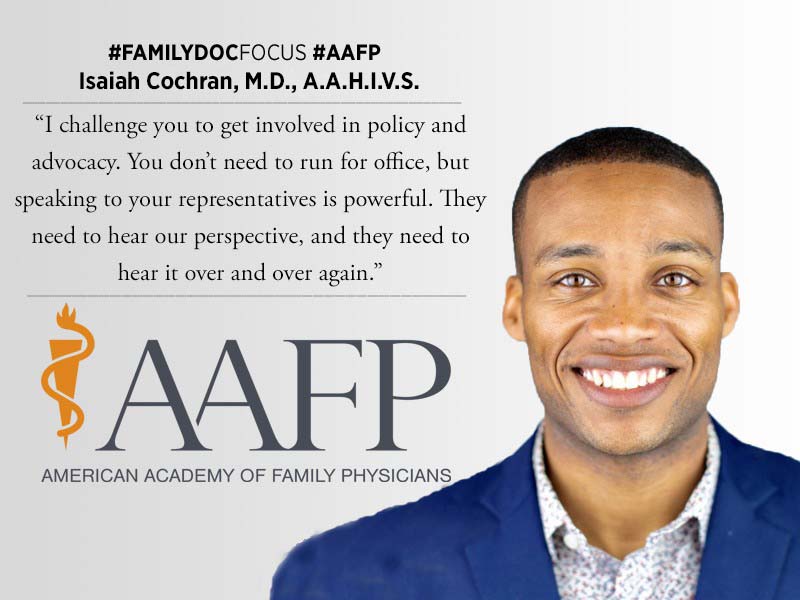Resident Hopes to Influence Health Care Beyond Exam Room
June 7, 2021, 4:12 p.m. David Mitchell — Isaiah Cochran, M.D., A.A.H.I.V.S., won’t be satisfied helping his own patients. He wants to help yours, too.

Cochran, who is finishing his first year at the Halifax Medical Center Family Medicine Residency in Daytona Beach, Fla., plans to run for local office “sooner rather than later” in his medical career.
“Getting involved in politics is ultimately where I’m headed,” he said. “I want to dedicate a lot of time to policy and advocacy. With the pathway I have chosen, some would say, ‘Why not go to law school instead?’ But as a lawyer I wouldn’t have the experience I want. The health care system needs to be adjusted.”
Cochran chose family medicine specifically because he wanted broad exposure to the U.S. health care system.
“I knew family medicine would allow me to see everything, not just from pediatrics to geriatrics but also so many different scenarios,” he said. “As a family medicine resident, I’ve already seen so much and really lived the experience that, yes, we do need more affordable medications and health care for all. There are a lot of disparities that need to be addressed. Being a family physician, I’ll have a good understanding of the interconnectedness of medicine, socioeconomic status and education. That’s important and will give me a perspective many people in elected office don’t have.”
Cochran’s perspective qualifies as unique in other ways, too.
“There are not a lot of Black men in medicine, especially LGBTQ men,” he said.
In fact, the proportion of Black men in the U.S. physician workforce was 2.6% in 2018, down slightly from 2.7% in 1940. There’s no surge coming soon. Black men made up just 2.9% of U.S. medical students in 2019-20.
Cochran will lead a health advocacy breakout group during a workshop regarding underrepresented students at the AAFP’s FUTURE, formerly National Conference of Family Medicine Residents and Medical Students, which will be held online July 29-31. That session will help students find their voice and get involved in leadership opportunities.
“These little things add up and give me exposure to the things I want to do,” said Cochran, who also is working on an anti-racism curriculum as part of his role with the American Medical Student Association Foundation.
Cochran already has taken on leadership roles in medicine, serving as the national president of AMSA during the 2019-2020 academic year while he was a student at Wright State University’s Boonshoft School of Medicine in Dayton, Ohio. He recently transitioned from immediate past president to a role on the AMSA Foundation Board of Directors.
“I don’t want to step away from AMSA because I think it’s a great opportunity to give back to other students and to inform other students about the type work that needs to be done,” said Cochran, who also is the resident member of the AAFP Commission on Federal and State Policy.
AAFP resident and student leadership positions for the 2021-2022 academic year, including roles on the Academy’s commissions are open for applications now.
“If you’re somebody who wants to learn more about leadership in medicine, it’s a great opportunity,” Cochran said. “If you are someone who has a liking for a certain topic, explore it. And you get to meet people from across the country.”
Cochran said it’s important for students, residents and physicians to realize they can make a difference outside the clinical setting.
“With the position we have, especially in family medicine, we see so many things,” he said. “I challenge you to get involved in policy and advocacy. You don’t need to run for office, but speaking to your representatives is powerful. They need to hear our perspective, and they need to hear it over and over again.”
The AAFP will be hosting information sessions June 8, July 13 and Aug. 5 regarding resident and student leaders. Current leaders will discuss their involvement with the Academy and answer participants’ questions.